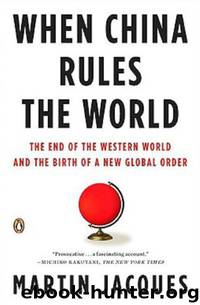When China Rules the World: The End of the Western World and the Birth of a New Global Order by Martin Jacques

Author:Martin Jacques [Jacques, Martin]
Language: eng
Format: epub
Tags: Non-Fiction
ISBN: 9781594201851
Google: 7HeNNQEACAAJ
Amazon: 0143118005
Publisher: Penguin Press
Published: 2009-04-15T07:00:00+00:00
CHINA’S NEW TURN
At the beginning of the 1990s China, with the reform era already a decade old, still existed for the most part in a state of splendid isolation, a condition that it had inherited from the Maoist era. The suppression of the Tiananmen Square demonstration exacerbated this state of affairs, leading to China’s estrangement by the West and its condemnation by Japan.12 Throughout the nineties, China steadfastly refused to countenance being a party to any regional multilateral arrangements,13 fearing that it would be obliged to play second-fiddle to Japan, aware that the United States was strongly opposed to regional organizations from which it was likely to be excluded14 and, not least, still imbued with that traditional regional aloofness born of its pervasive sense of superiority. It was only in the early 1990s that China had established diplomatic relations with South Korea, Singapore, Indonesia, Vietnam and Brunei.15 By the end of the decade, however, China had determined on a very different strategy, one that it was to implement with breathtaking speed.
Already, in 1994, it had established the Shanghai Five with Russia, Kazakhstan, Kyrgyzstan and Tajikistan in response to the collapse of the Soviet Union in Central Asia and a desire to engage with Russia and foster co operation on its traditionally troublesome north-western border. It was not until 2001, however, with the formal establishment of the Shanghai Co-operation Organization (SCO), that this was to be translated into something more thorough-going, with a permanent office in Shanghai, the addition of Uzbekistan and the acquisition of new and more extensive functions.16 The purpose of the SCO would appear to be threefold: to promote cooperation in Central Asia, to counter Islamic extremism and to resist American influence in the region. Over the subsequent years, India, Iran, Pakistan, Mongolia and Afghanistan have acquired observer status, while representatives are also invited from ASEAN and the CIS (composed of the former Soviet Republics). SCO’s future is difficult to assess but it certainly represents a powerful bloc of Central Asian countries and, significantly, remains outside the aegis of American influence. The heart of China’s new strategy, though, lay not to its north-west but to its south-east, a region towards which, in comparison, China had for centuries displayed for the most part benign neglect and traditional indifference. It is no exaggeration to suggest that the fulcrum of China’s strategy in East Asia - certainly as it has evolved over the last decade - came to hinge on a volte-face in its attitude towards ASEAN, the organization of the ten nations of South-East Asia that was formed in 1967.17
How do we explain China’s belated embrace of multilateralism? First and foremost, its dramatic economic growth after 1978 generated a growing sense of self-confidence and enabled the country to entertain new and more ambitious perspectives. Second, by the turn of the century China was on the verge of membership of the World Trade Organization, thereby marking its entry into the global international system and signalling its global acceptance of multilateralism. Third,
Download
This site does not store any files on its server. We only index and link to content provided by other sites. Please contact the content providers to delete copyright contents if any and email us, we'll remove relevant links or contents immediately.
| Arms Control | Diplomacy |
| Security | Trades & Tariffs |
| Treaties | African |
| Asian | Australian & Oceanian |
| Canadian | Caribbean & Latin American |
| European | Middle Eastern |
| Russian & Former Soviet Union |
The Secret History by Donna Tartt(19032)
The Social Justice Warrior Handbook by Lisa De Pasquale(12183)
Thirteen Reasons Why by Jay Asher(8885)
This Is How You Lose Her by Junot Diaz(6873)
Weapons of Math Destruction by Cathy O'Neil(6261)
Zero to One by Peter Thiel(5782)
Beartown by Fredrik Backman(5734)
The Myth of the Strong Leader by Archie Brown(5494)
The Fire Next Time by James Baldwin(5424)
How Democracies Die by Steven Levitsky & Daniel Ziblatt(5211)
Promise Me, Dad by Joe Biden(5141)
Stone's Rules by Roger Stone(5080)
A Higher Loyalty: Truth, Lies, and Leadership by James Comey(4946)
100 Deadly Skills by Clint Emerson(4912)
Rise and Kill First by Ronen Bergman(4776)
Secrecy World by Jake Bernstein(4738)
The David Icke Guide to the Global Conspiracy (and how to end it) by David Icke(4697)
The Farm by Tom Rob Smith(4500)
The Doomsday Machine by Daniel Ellsberg(4482)
